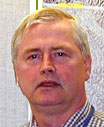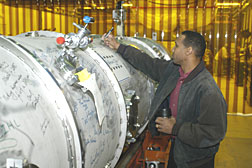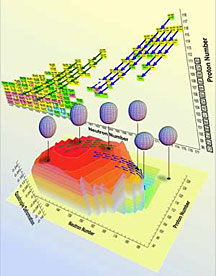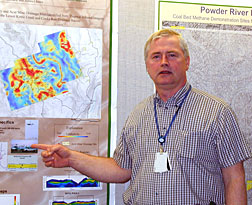| Research
|
Whether he's knee-deep in water or flying over it, Terry Ackman still has his feet firmly planted on the ground as he leads the internationally recognized Water and Energy Team at DOE's National Energy Technology Laboratory (NETL). The Team, which conducts basic and applied research into regional and national water pollution problems within NETL's Geosciences Division, initially pioneered the passive treatment of coal mine drainage by developing techniques *now commercialized* to cost-effectively treat polluted mine drainages. With that success, the Team expanded its expertise to encompass research into watershed issues as diverse as examination of options for power plant cooling water to bioremediation of soil contaminated by oil and natural gas wells. Having a personal interest in outdoor activities such as boating and fishing, Terry is no stranger to water. His research has required that he don hip-boots to extract samples from streams and rivers; at other times, he has participated in helicopter flyovers of watersheds and mine sites. By dangling technology called a "frequency-domain electromagnetics" 100 feet beneath a helicopter flying at 200 feet, Terry's efforts have pioneered three-dimensional imaging of groundwater flow over areas ranging from Pennsylvania to the Wyoming-Montana border to California . Those efforts have been recognized by the Pennsylvania Department of Environmental Protection, the state's Environmental Council, the U.S. Department of Interior, and Pollution Engineering magazine. Not resting on their laurels, Terry and his team are now addressing safety and stability issues at 14 different coal slurry impoundments, conducting flyovers with alternative technology to locate underground mine pools at deeper depths and refining a prototype water-powered treatment system, which hopefully will allow power generation from a hydro microturbine to offset chemical costs. Whether Terry's research is focused above, on, or below ground, the net effect is that it has a direct, positive impact on the environment.Submitted by DOE's
National Energy |
|||||||||||||||||||||||||
|
Check out symmetry—the
|
CFCC to Emphasize Development of Colorado Fuel Cell IndustryDOE's National Renewable Energy Laboratory has joined with academic and industrial partners to help Colorado foster the growth of fuel cell development. The Colorado Fuel Cell Center, established through a competitive process managed by the Colorado Governor's Office of Energy Management and Conservation (OEMC), will combine state of the art research, education and public outreach to promote the development of fuel cell technology and economic development in the state. Partners in the CFCC are NREL, the Colorado School of Mines (CSM), the Gas Technology Institute (GTI) and Versa Power Systems, Inc. (VPS). "We are so happy to be partnering with such exceptional colleagues on this exciting venture," said Sue Hock, director of NREL's Center for Electric and Hydrogen Technologies and Systems. "We expect to contribute our technical skills to support the development of improved technologies for a future hydrogen economy." NREL will provide support for the CFCC as well as continue work on the DOE-funded Hydrogen, Fuel Cells, and Infrastructure Development (HFCIT) program. The research of hydrogen production, storage and end-use technologies such as fuel cells is a major component of the HFCIT program and NREL has a highly active role in the development of these technologies with specific emphasis on the link to renewable energy. Researchers at NREL are currently helping to acquire equipment necessary for the CFCC to fabricate and test advanced fuel cells. The new equipment includes testing stations capable of performance-testing fuel cell stacks. Besides access to a sophisticated research laboratory, companies will have the opportunity for collaboration with researchers, students and faculty from the partnership as well as other users of the CFCC. "The state wanted to support education and one of its goals was to introduce fuel cell research to students," Hock said. CSM students and faculty will perform part of the research on electrochemical technology, materials and fuel processing. CSM has plans to add fuel cell courses to the existing curriculum and oversee all student and faculty research programs. As an additional part of the CFCC education and public outreach efforts, curriculum will be developed for distribution to local high schools, technical schools and colleges for inclusion in chemistry and science courses. Materials will also be available for use at technical and business conferences as well as on the CFCC Web site. NREL, CSM, GTI and VPS contributed $1 million to match OMEC's $2 million investment for the establishment of the CFCC. The CFCC will be located in the General Research Laboratory at CSM and will be managed by GTI. Submitted by DOE's
National Renewable |




